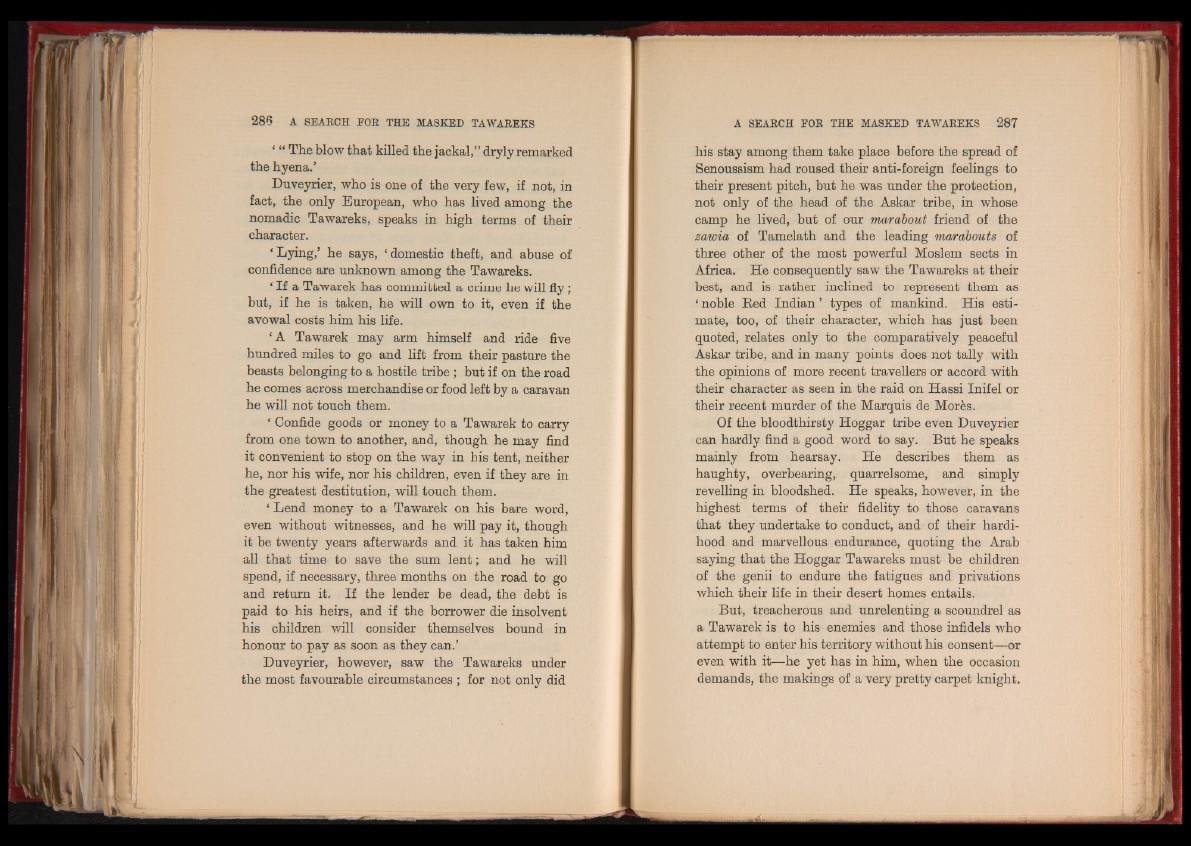
‘ “ The blow that killed the jackal,” dryly remarked
the hyena.’
Duveyrier, who is one of the very few, if not, in
fact, the only European, who has lived among the
nomadic Tawareks, speaks in high terms of their
character.
‘Lying,’ he says, ‘domestic theft, and abuse of
confidence are unknown among the Tawareks.
‘ If a Tawarek has committed a crime he will fly;
but, if he is taken, he will own to it, even if the
avowal costs him his life.
‘A Tawarek may arm himself and ride five
hundred miles to go and lift from their pasture the
beasts belonging to a hostile tribe ; but if on the road
he comes across merchandise or food left by a caravan
he will not touch them.
‘ Confide goods or money to a Tawarek to carry
from one town to another, and, though he may find
it convenient to stop on the way in bis tent, neither
he, nor his wife, nor his children, even if they are in
the greatest destitution, will touch them.
‘ Lend money to a Tawarek on his bare word,
even without witnesses, and he will pay it, though
it be twenty years afterwards and it has taken him
all that time to save the sum lent; and he will
spend, if necessary, three months on the road to go
and return it. If the lender be dead, the debt is
paid to his heirs, and if the borrower die insolvent
his children will consider themselves bound in
honour to pay as soon as they can.’
Duveyrier, however, saw the Tawareks under
the most favourable circumstances ; for not only did
his stay among them take place before the spread of
Senoussism had roused their anti-foreign feelings to
their present pitch, but he was under the protection,
not only of the head of the Askar tribe, in whose
camp he lived, but of our marabout friend of the
zawia of Tamelath and the leading marabouts of
three other of the most powerful Moslem sects in
Africa. He consequently saw the Tawareks at their
best, and is rather inclined to represent them as
‘ noble Bed Indian ’ types of mankind. His estimate,
too, of their character, which has just been
quoted, relates only to the comparatively peaceful
Askar tribe, and in many points does not tally with
the opinions of more recent travellers or accord with
their character as seen in the raid on Hassi Inifel or
their recent murder of the Marquis de Mores.
Of the bloodthirsty Hoggar tribe even Duveyrier
can hardly find a good word to say. But he speaks
mainly from hearsay. He describes them as
haughty, overbearing, quarrelsome, and simply
revelling in bloodshed. He speaks, however, in the
highest terms of their fidelity to those caravans
that they undertake to conduct, and of their hardihood
and marvellous endurance, quoting the Arab
saying that the Hoggar Tawareks must be children
of the genii to endure the fatigues and privations
which their life in their desert homes entails.
But, treacherous and unrelenting a scoundrel as
a Tawarek is to his enemies and those infidels who
attempt to enter his territory without his consent—or
even with it—he yet has in him, when the occasion
demands, the makings of a very pretty carpet knight.